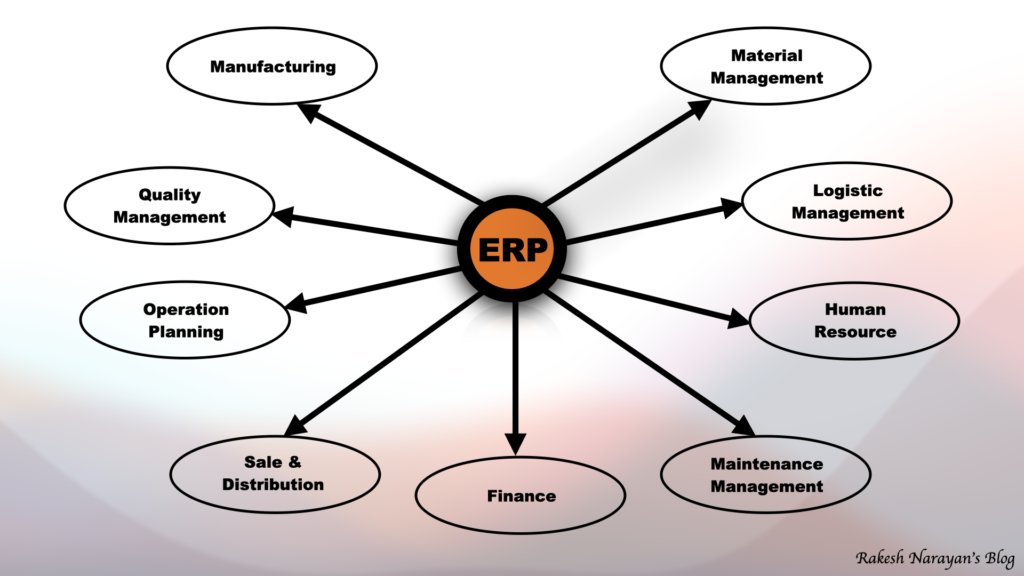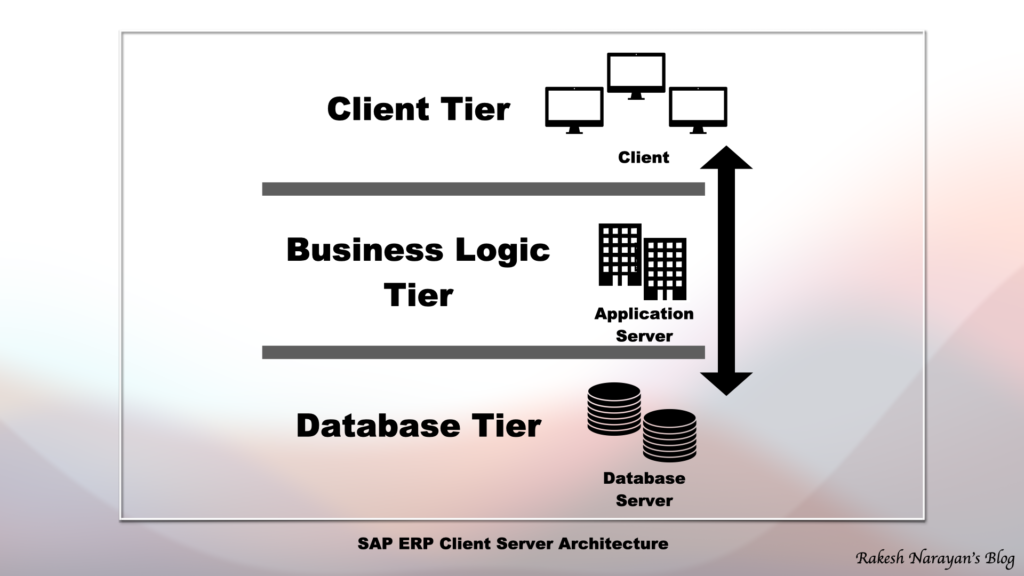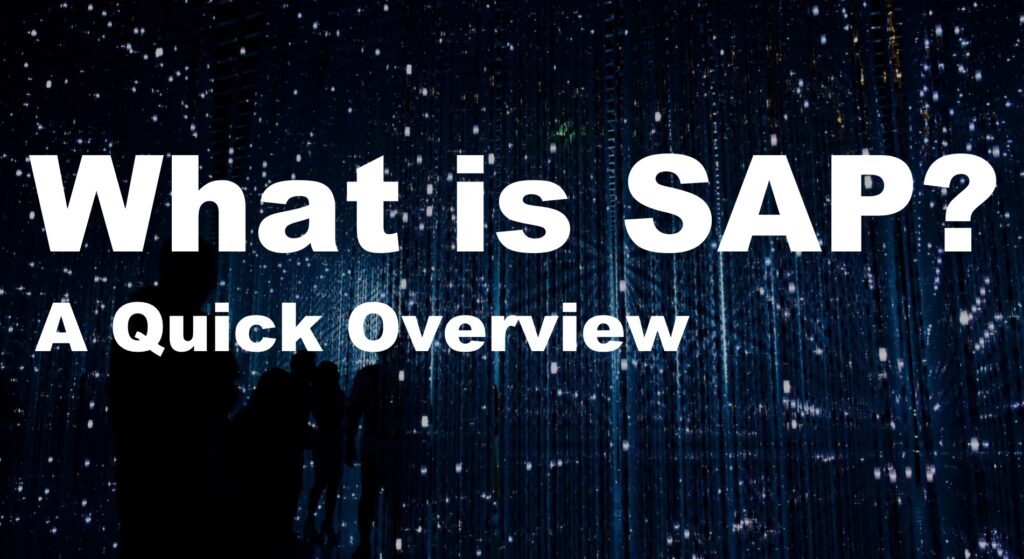What is ERP?
All you need to Know – A Complete Overview
Introduction
Enterprise Resource Planning (ERP) is a software system that streamlines and automates business processes, allowing organizations to efficiently manage and utilize their resources. An ERP system typically integrates multiple modules, including financial management, inventory management, human resources, customer relationship management, and supply chain management.
For example, a manufacturing company may require an ERP system with modules for production planning and shop floor management, while a retail company may require modules for point-of-sale and inventory management.

Evolution and History of ERP
ERP or Enterprise Resource Planning is an industry-standard term used for software designed to manage businesses’ daily operations. The first material requirements planning (MRP) software developed in 1964 paved the way for the development of ERP. In the 1990s, ERP systems became more comprehensive and were capable of handling financial, manufacturing, distribution, and human resource processes. The term ERP was coined in the 1990s when vendors such as SAP, Oracle, and Microsoft started developing software suites that integrated multiple modules. Today, ERP systems are almost everywhere, with a projected global market size of over $49 billion by 2025.
Benefits of Having an ERP
Implementing ERP solutions can have substantial benefits for businesses. These benefits include:
Enhanced Efficiency
ERP systems enable businesses to automate manual processes, such as data entry, report generation, and interdepartmental communication, which, in turn, reduces the likelihood of human error.
Improved collaboration
ERP systems integrate departments and business processes, resulting in improved inter-departmental communication and better collaboration.
Better Data Management
An ERP system provides businesses with a centralized source of data, allowing decision-makers access to real-time information across the organization.
Cost Reduction
An ERP system reduces costs by streamlining processes and reducing the need for manual labor, saving time and money.
Types of ERP
ERP systems can be broadly categorised into four main types:
On-Premise ERP
On-premise ERP systems require businesses to host the system and associated data on their servers. This type of ERP provides greater flexibility and control over data.
Cloud-Based ERP
Cloud-based ERP or Cloud-ERP systems are hosted on a vendor’s cloud server and accessed through the Internet. This type of ERP is quickly becoming the most popular, as it provides businesses with greater accessibility, flexibility, and scalability.
Open Source ERP
Open-source ERP systems are built as community-driven projects that anyone can contribute to or download. This type of ERP is usually free and provides businesses with greater control over their data.
Hybrid ERP
Hybrid ERP is a combination of on-premise and cloud-based ERP systems. This type of ERP offers businesses the best of both worlds, with greater control over data and real-time access via the cloud.
Possible Integration of ERP
ERP systems typically need to be integrated with other applications and systems to work effectively. Some common systems integrated with ERP include:
Customer Relationship Management (CRM) Systems
CRM systems provide businesses with a central database of customer information, allowing for better customer management.
Supply Chain Management (SCM) Systems
ERP systems integrated with SCM systems allow businesses to manage their supply chains more effectively, reducing lead times, and lowering inventory costs.
Financial Management Systems
ERP systems integrated with financial management systems provide businesses with real-time financial data, allowing for better financial planning and decision-making.
Basic Architecture of ERP
ERP systems generally consist of a database server, an application server, and a client-side interface. The database server contains all the data stored in the ERP system. The application server manages the various modules of the ERP system, and the client-side interface allows users to interact with the system.

Future Possibilities of ERP
As technology evolves, so does the potential of ERP systems. Some of the future possibilities of ERP include:
Advanced Analytics
With the increase in real-time data availability, businesses can use advanced analytics to gain insights into their operations and make better decisions.
Artificial Intelligence and Machine Learning
ERP systems can leverage AI and machine learning algorithms to automate processes, improve decision-making, and enhance machine-human interaction.
Augmented Reality
ERP systems integrated with augmented reality can provide field service technicians with real-time data on equipment parts and maintenance procedures.
SAP ERP
SAP is one of the leading providers of ERP systems, with over 437,000 customers in 180 countries. SAP’s ERP software suite consists of over 25 modules, including financial management, supply chain management, and human resource management.
Examples of SAP ERP include
SAP S/4HANA: This ERP system provides businesses with real-time data access and processing.
SAP Business One: This ERP system is designed for small and medium-sized businesses and provides integrated financial, manufacturing, and supply chain management functionality.
SAP Ariba: This cloud-based procurement solution enables businesses to manage their procurement processes, including sourcing, contracting, and payment, all via the cloud.
Summary
ERP systems continue to play a critical role in businesses worldwide, providing a centralized platform for data management and an integrated approach to business processes. As technology continues to evolve, the future possibilities of ERP systems are endless. SAP ERP occupies a prominent place within the industry, providing a comprehensive suite of modules catering to businesses of all sizes.
ERP systems have changed the way business operates, streamlining processes and providing a standardized approach to data management. With ERP software now available in a variety of types and systems, it is easier than ever for businesses to adopt an ERP system. The benefits of an ERP system are countless, including enhanced efficiency, better data management, reduced costs, and improved collaboration. As businesses continue to face new challenges, ERP systems will likely continue to evolve and offer new solutions, making it an ever-more essential aspect of daily operations.
FAQ – Frequently Asked ERP Questions And Answers
Below are a few frequently asked questions and answers:
What does ERP stand for?
ERP stands for Enterprise Resource Planning.
Is SAP an ERP system?
Yes, SAP is a leading enterprise resource planning (ERP) software system. It is used by organizations of all sizes and across all industries to manage their business functions, such as finance, procurement, production planning, sales, inventory, and human resources.
What is ERP software, and what does it do?
ERP software refers to a suite of applications that help businesses manage their day-to-day operations. It mainly deals with financial, manufacturing, sales, distribution, and customer service functions, and integrates these functions to deliver centralized data. With ERP softwares in place, organizations can monitor and manage their operations efficiently.
What are the benefits of an ERP system?
An ERP system provides several benefits to businesses. These benefits include enhanced efficiency, better collaboration, improved data management, reduced costs, and enhanced scalability. Implementing an ERP system consolidates disparate processes, reduces costs, enhances workflow, and helps businesses stay competitive.
How does an ERP system work?
An ERP system typically consists of several components, including a database server, an application server, and client-facing interfaces. The system manages data input, processing, and distribution across the various applications and modules. The ERP system ensures that the different departments of the organization share the right data and that all the business processes are streamlined.
What are the different types of ERP systems?
The different types of ERP systems include on-premise, cloud-based, open-source, and hybrid ERP systems. Each has its own advantages and disadvantages, and organizations need to assess their specific requirements before choosing the one that would be the best fit for their needs.
What are some common modules of an ERP system?
Some common modules of an ERP system include financial management, human resource management, manufacturing, supply chain management, sales and marketing, customer relationship management, and inventory management.
How long does it take to implement an ERP system?
The time required to implement an ERP system depends on the organization’s size, complexity of its business processes, and the type of ERP system being implemented. It can take anywhere from a few months to a year or more.
What should businesses consider when choosing an ERP system?
While choosing an ERP system, organizations need to consider factors such as their budget, specific business needs, scalability, security, user-friendliness, and integration capabilities.
Can an ERP system be customized to suit the needs of an organization?
Yes, an ERP system can be customized to meet the specific needs of an organization. However, customization should be done carefully, as over-customization can increase the system’s complexity, cost, and may make it challenging to maintain and update.
How can an ERP system improve data management?
An ERP system provides a centralized platform for data management, making it easier for businesses to store, access, and manage their data. With an ERP system in place, organizations can ensure that data is consistent, accurate, and up-to-date, and is available to authorized users across the organization.
Can an ERP system integrate with other business applications?
Yes, an ERP system can be integrated with other business applications to provide a seamless flow of information across the organization. Some common applications that can be integrated with an ERP system include customer relationship management (CRM), supply chain management (SCM), and business intelligence (BI) software.
What are the risks associated with the implementation of an ERP system?
The risks associated with ERP implementation include lack of user adoption, organizational resistance to change, system complexity, and data security issues. To mitigate these risks, organizations should invest in proper employee training, change management, and data security measures.
What is the role of a consultant in ERP implementation?
An ERP consultant provides organizations with expert guidance on the implementation process and can assist in identifying specific business requirements, choosing the right ERP system, and ensuring a successful implementation.
How can an ERP system improve productivity?
An ERP system can improve productivity by streamlining processes and reducing manual labor. It provides a centralized platform for data management and enables real-time access to critical business information, enhancing decision-making capabilities, and reducing errors and delays.
Is an ERP system suitable for small businesses?
Yes, an ERP system is suitable for small businesses, provided they choose a system that is cost-effective, scalable, and easy to use. Small businesses can benefit from the centralized data management, streamlined processes, and improved efficiency that an ERP-system provides.
What is the role of data security in an ERP system?
Data security is critical in an ERP system as it contains sensitive business information that, if breached, can have severe consequences. Businesses should implement proper data security measures, including access controls and encryption, to protect their data from unauthorized access and cyber attacks.
Can an ERP system help businesses comply with regulatory requirements?
Yes, an ERP-system can help businesses comply with regulatory requirements by providing accurate, up-to-date, and auditable records of business transactions. The erp-system can also generate reports and statements needed to comply with regulations such as tax compliance, financial reporting, and labor law compliance.
What are some of the challenges associated with ERP implementation?
Implementing an ERP-system can be complex, time-consuming, and expensive. Some of the challenges associated with ERP implementation include data migration, system configuration, user adoption, and business process reengineering.
Can an ERP system be accessed remotely?
Yes, most ERP-systems can be accessed remotely, provided there is an internet connection. This offers employees the flexibility to work from anywhere and provides businesses with global access to their operations.
What is the role of training in ERP implementation?
Training is essential in ERP implementation as it ensures that employees are familiar with the system, know how to use it effectively, and can achieve their daily tasks efficiently. Employee training helps accelerate user adoption, reduces errors and improves productivity.
How can businesses measure the effectiveness of an ERP system?
Businesses can measure the effectiveness of their ERP system by setting appropriate metrics and analyzing the data generated by the system. Key performance indicators (KPIs) such as productivity, revenue, cycle time, inventory turnover, and customer satisfaction can help assess the system’s effectiveness and identify areas for improvement. Regular system audits can also provide valuable insights into system performance and identify potential issues that need to be addressed.
Can an ERP system be used in multiple languages?
Yes, an ERP system can be used in multiple languages, depending on the system’s capabilities and configuration. This is particularly important for businesses that operate in multiple countries or regions and need to communicate with employees and customers in different languages.
How can an ERP system improve customer service?
An ERP system can improve customer service by providing real-time access to customer data, enabling efficient and accurate order processing, and ensuring timely delivery of products or services. It also streamlines customer service processes, such as handling returns, complaints, and inquiries, ensuring timely resolution and excellent customer experience.
What is the difference between ERP and CRM?
ERP and CRM are two different software systems used by businesses to manage their operations. ERP systems handle back-office functions such as financial management, inventory management, and manufacturing, while CRM systems handle front-office functions such as customer relationship management, sales, and marketing.
Can an ERP system integrate with e-commerce platforms?
Yes, an ERP system can integrate with e-commerce platforms, such as Shopify, Magento, or WooCommerce, to manage inventory, process orders, and track shipments. This helps ensure smooth operations, reduce costs, and enhance customer experience.
How can an ERP system help businesses manage their supply chain?
An ERP system can help businesses manage their supply chain by providing real-time visibility, inventory tracking, demand forecasting, and order management capabilities. This enables businesses to streamline their procurement process, reduce lead times, optimize inventory levels, and enhance supplier relationships, resulting in more efficient and cost-effective supply chain management.
Can an ERP system be accessed through mobile devices?
Yes, most modern ERP systems offer mobile access, allowing users to access the system through their mobile devices. Mobile access enables employees to work remotely, access data and modules on the go, and respond to business needs in real-time while ensuring security and data protection.
Can an ERP system be used in industries other than manufacturing?
Yes, an ERP system can be used across different industries, including retail, healthcare, education, construction, and professional services, among others. However, businesses need to choose an ERP system that caters to their specific industry needs and requirements.
What is the role of ERP software in digital transformation?
ERP software plays a critical role in digital transformation by providing a foundation for businesses to transform their operations through digital technologies. ERP systems are modular, configurable, and scalable, making them capable of integrating with new digital technologies such as IoT, machine learning, and AI, to help businesses enhance their operations and stay competitive.
Know more about the Blog and the Author.
Related search terms:
what is an erp system, epicor erp, infor erp, epicor-erp



